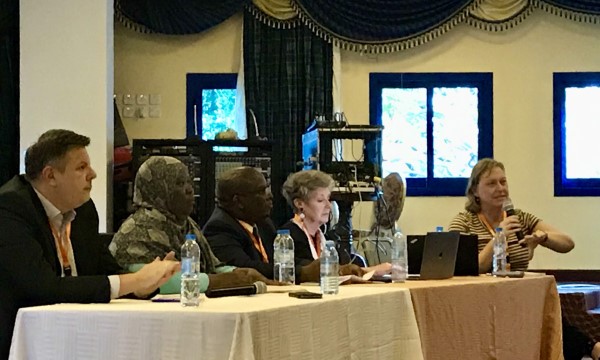Emerging Issues in CRVS and IDEntebbe, Uganda, 18 November 2019
Session organized by the IUSSP Panel on Population Perspectives and Demographic Methods to Strengthen Civil Registration and Vital Statistics (CRVS) Systems at the 8th African Population Conference.
The 8th African Population Conference brought together researchers, governments, and many others interested in population data from across African and globally. This was a key opportunity to advance the conversation started at meetings such as ID4Africa, and the Fifth Conference of African Ministers responsible for Civil Registration, held earlier in 2019 in the region, on how to take advantage of the changing CRVS landscape to provide better population data in a safe and responsible way to support development outcomes.
CRVS investments in Africa have increasingly become linked with the development of broader national identity management approaches, including the use of biometrics and establishment of separate national identity authorities. The United Nations and key development partners are increasingly discussing the importance of a life-cycle approach to legal identity and advocating the importance of CRVS in this broader approach to identity authorities. While these new approaches have a range of potential benefits – not least of which are a way into legal ID for the millions whose births have not been previously registered and the potential for data linkage that could substantially improve our understanding and analysis of important development issues; there are also potential concerns re data protection, privacy and appropriate use.
The panel, which comprised Kazija Khamis Said (Office of the Chief Government Statistician, Zanzibar, Tanzania), Sandile Simelane (Technical Division, UNFPA), Zoran Djokovic (Consultant for IDRC), discussant Ellen Percy Kraly (Professor at Colgate University), and was chaired by Karen Carter, member of the IUSSP “CRVS” Panel, explored a range of key questions in collaboration with the session audience. In particular the panel examined the importance of CRVS in national identity, the potential of these changing data landscapes to improve our understanding of vulnerable and marginalized populations and improve inclusion, and the emerging risks and concerns around these systems. Issues of data access, including the role of researchers and the need to better define data uses of linked identity data, the importance of strong legal frameworks, and building and maintaining community trust were all examined. Case examples from the Compendium of Good Practice currently being developed by the IDRC - including examples of linkage between the CRVS and national ID systems were also presented. The discussion also examined the role that demographers can and should play in these emerging discussions and how we can better engage with specialists across a broad range of professions to ensure a holistic and balanced approach to CRVS and identity data. Findings from the panel will form the basis of a broader discussion piece currently under development.

The 8th African Population Conference was organised by the Union of African Population Studies (UAPS). This session was organized by the IUSSP Panel on Population Perspectives and Demographic Methods to Strengthen Civil Registration and Vital Statistics (CRVS) Systems. The panel receives support from the International Development Research Collaborative (IDRC), of Canada, which also supported panellists to attend this conference. The views expressed are those of the panellists, and do not necessarily reflect those of any of the organisations represented. |
